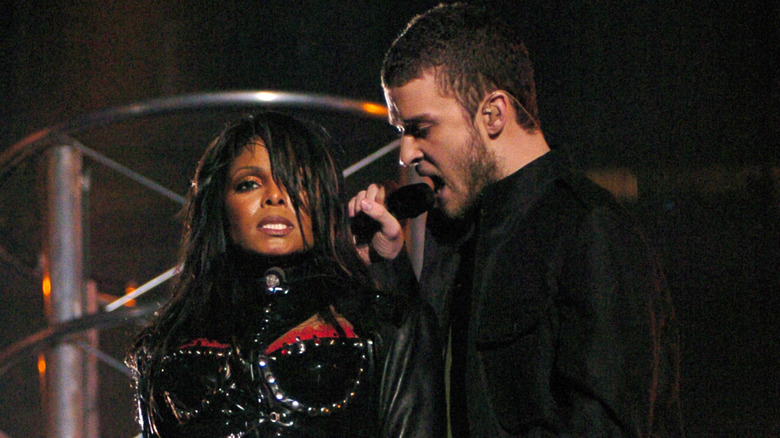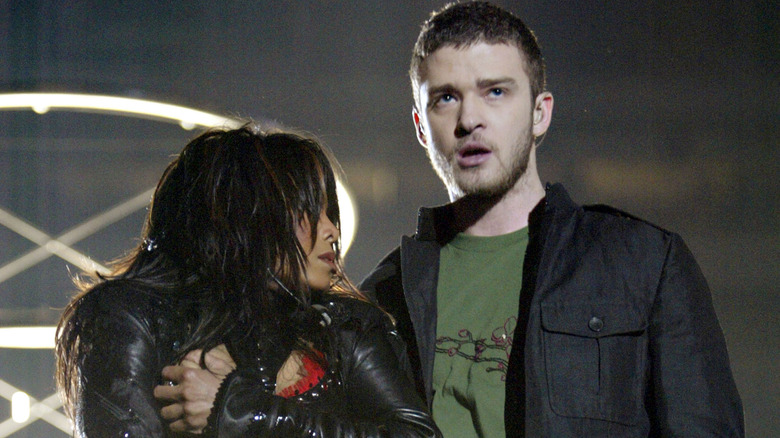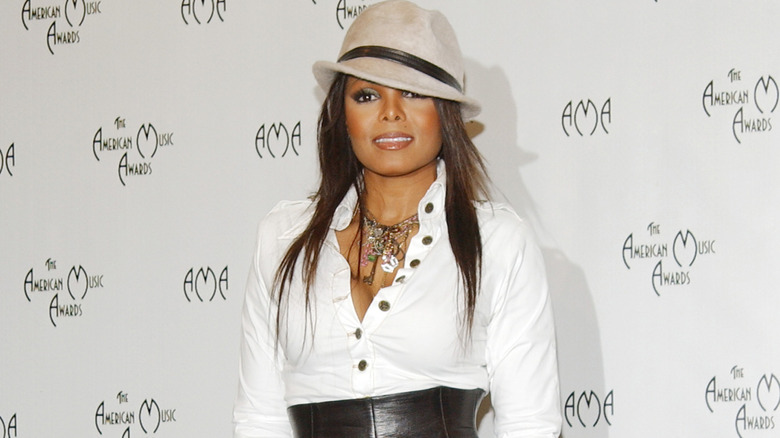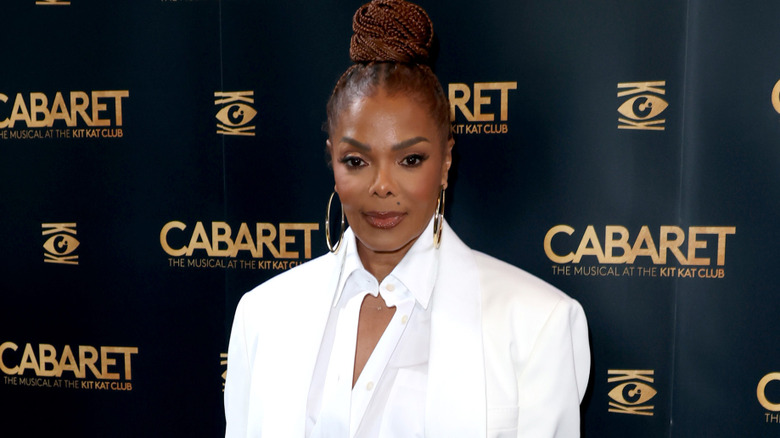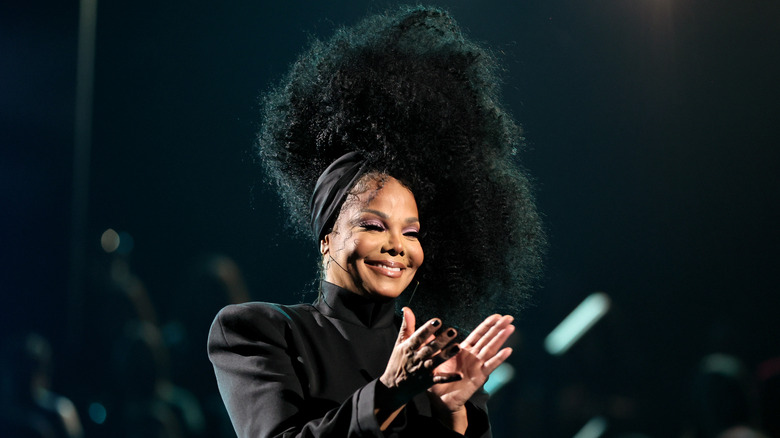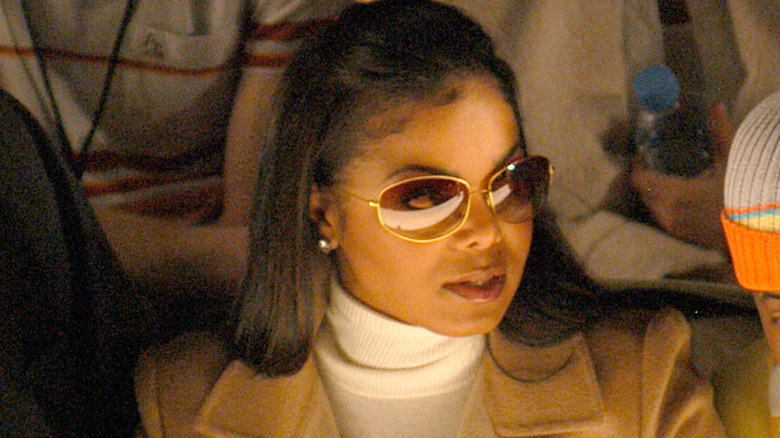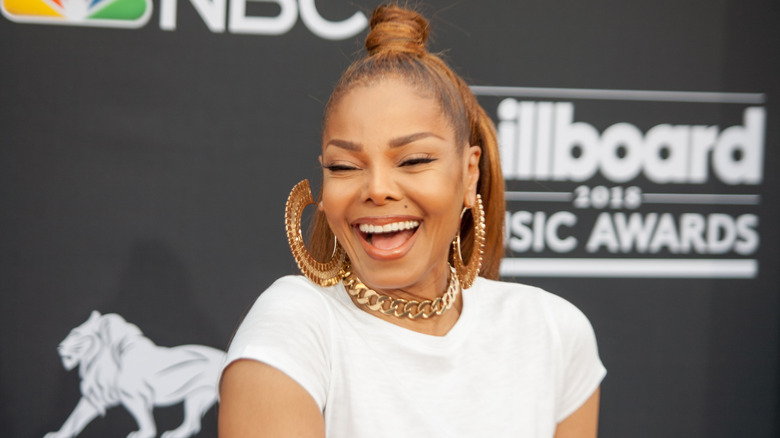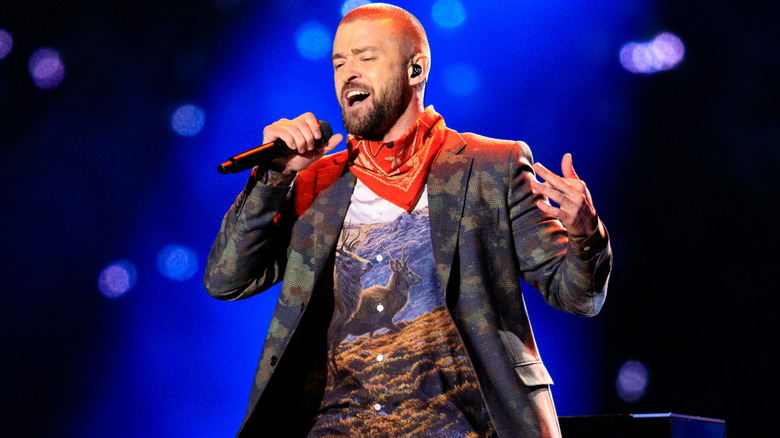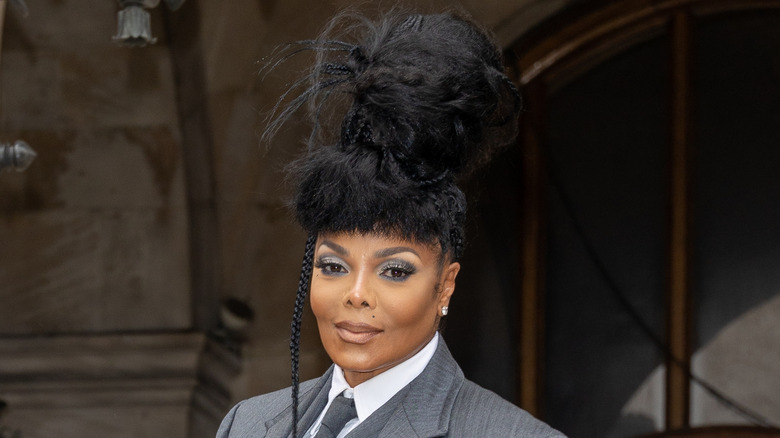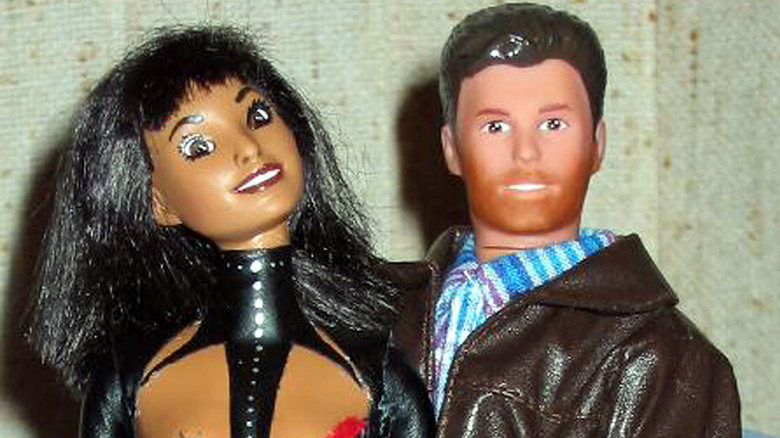We Looked Back At The Janet Jackson Super Bowl Disaster And It's So Different Now
Every year, the Super Bowl Halftime Show unites millions of viewers worldwide to experience one of the most anticipated performances of the year. But few of those performances made headlines as much as the 2004 show, headlined by Janet Jackson. While some of that year's special guests — including Jessica Simpson, Diddy, Nelly, and Kid Rock — made headlines in their own right, it was Justin Timberlake's appearance at the climax of the set that spurred a scandal that has been perpetuated in the press for decades.
With a poorly timed breast slip, what was once a flurry of top 40 bops became a PR nightmare that saw misogyny take center stage; it even arguably caused the downfall of Janet Jackson's career and even became the reason why Janet Jackson got banned from the Grammys. Public opinion that once blamed Jackson took almost twenty years to turn on Timberlake, but in the end, the artists claim it all stemmed from an unplanned moment. "It was an accident that should not have happened, but everyone is looking for someone to blame," Jackson admitted in a candid interview in her 2022 documentary "Janet" (via People). "And that has got to stop."
Janet and JT took the stage and turned heads during the 2004 Super Bowl Halftime Show
By the time that Janet Jackson and Justin Timberlake came together to close the 2004 Super Bowl Halftime Show, the audience had already had their fair share of star power. As the two crooners strutted their stuff to Timberlake's hit "Rock Your Body," with Jackson sweetly singing the refrain, they got closer and closer to each other. But things came to a screeching halt as Timberlake reached the apex of the song, singing "I'll have you naked by the end of this song." The pop star moved his hand to seemingly cup the "All For You" singer's breast and pull back her top to reveal her lacy bra, but he instead pulled both the corset and bra off, leaving Jackson's bare breast and nipple shield exposed and on air for millions worldwide to gape at.
Instantaneously, the so-called "wardrobe malfunction" ignited a backlash against Jackson that saw intense scrutiny met with misogyny and racism. The irony? Jackson's team had promised that the Halftime Show would be one full of surprises: "There are some shocking moments in there," one of the star's choreographers revealed to MTV News just before the performance (via People).
Then: Janet Jackson faced immediate intense scrutiny, media bans
The fallout from the flashy crescendo was immediate — and one-sided. Cries of the incident being a PR stunt ran rampant from audiences to executives, with numerous public statements made about the crass nature of the supposedly planned moment. "This was done completely without our knowledge," said Chris Ender, an entertainment spokesman for CBS, when speaking to CBS News. "It wasn't rehearsed. It wasn't discussed. It wasn't even hinted at ... This is something we would have never approved. We are angry and embarrassed."
The vitriol spread to Jackson herself, who became blacklisted from public performances and pressured to withdraw the Grammy Awards that were scheduled for the very next week. Radio jockeys began blasting her on air, spreading the rumor that the revealing performance was all a ploy to boost sales of her upcoming album at the time, "Damita Jo," which ended up being one of her lowest-selling records since 1984. Things even went so far that then-MTV executive Tom Freston publicly shared that Jackson "engineered" the performance (via People).
The scandal spread beyond Jackson herself and created more everlasting effects on network production. Big-time stakeholders like the Federal Communications Commission (FCC) fined CBS $550,000 for violating broadcast regulations and launched an investigation; while the fine was held up for years in federal appeals court before being dismissed in 2008, its severity made headlines around the globe for months. As for the National Football League (NFL), they decided to stick to in-house staging of Halftime Shows rather than subbing out, and as a result, began to book tamer artists. "It's a balancing act," television consultant Lee Berke told the Houston Chronicle. "You have to have popular acts, so the NFL works with them to make sure there are no more wardrobe malfunctions."
Now: The media has been more forgiving towards Janet Jackson
Many years after "Nipplegate," and even fewer in the wake of the "Me Too" movement, attitudes have shifted and has shone a more sympathetic light on Janet Jackson. Some posed that the backlash was a massive overreaction and that the "Black Cat" singer was owed an apology. Others commented on the significance of a black woman being pushed to perform well by overbearing shareholders. "The pressure on her had to be significant," said Cathy Hughes, founder and chairperson of Urban One Inc., in the New York Times documentary "Malfunction: The Dressing Down of Janet Jackson" (via The Hollywood Reporter). "White executives always start from the premise of what is acceptable to their white audience."
Jackson's own famous family also chimed in after the fact, defending their fellow performer amidst the sea of controversy that came her way. "I don't know if blacklist is the word that they tried to do to my sister, but it sure seemed like they were trying to diminish her career," said brother Tito Jackson in the New York Times documentary (via The Hollywood Reporter). Janet's nephew Taj agreed, saying "You can call it whatever you want, but her career suffered because [of] someone whose ego was hurt."
Then: Janet's voice was silenced while Justin's was amplified regarding the performance
Immediately after the eye-popping performance, Janet Jackson reportedly left the stage in tears and exited the stadium quickly, declining to talk to reporters. Meanwhile, Justin Timberlake arguably took advantage of the situation at a time when his career was poised to skyrocket. When then-head of CBS Les Moonves requested that the two stars personally appear on the Grammys the week following the Super Bowl to publicly apologize, it was Timberlake who accepted (and later won two major awards that night) while Jackson declined and was subsequently blasted in the press. (She did, however, release a taped apology that aired on CBS two days after the event). Jackson did have some on her side, though. "It just felt like another request for something that was an accident, something that [she] just felt didn't need to be laid completely on her," Matt Serletic, former CEO of Virgin Records, shared in the New York Times documentary "Malfunction: The Dressing Down of Janet Jackson" (via The Hollywood Reporter). "So she didn't do it, and good for her."
While Jackson remained mainly silent for many years, Timberlake, on the other hand, made the radio circuit, sharing "his side" of the story. When asked about the incident (and he was asked a lot), he vacillated between making jokes about the situation or claiming nonchalance when he was trying to focus on his own career. "I'm frustrated that my character is being questioned and the fact of the matter is, you know, I've had a good year, a really good year, especially with my music," he told KCBS following the 2004 Super Bowl (via People).
Now: The tables have turned, as Janet has spoken out while Justin has apologized
Almost two decades after the initial backlash, and amidst rumors of his own indiscretions, Justin Timberlake changed his tune about not only his reaction to the Super Bowl that changed it all, but also to a series of missteps he had made in his career. "I am deeply sorry for the times in my life where my actions contributed to the problem, where I spoke out of turn, or did not speak up for what was right," he revealed in a lengthy and since-deleted Instagram post (via US Weekly). "I understand that I fell short in these moments and in many others and benefited from a system that condones misogyny and racism."
At the same time, Janet Jackson was ready to share her own side of the story and began speaking more to the press about her experience and how she coped with the deluge of emotions. "What's really important is going back to having that foundation," she told Allure in 2022. "Not just family, but God. That's what really pulled me through."
But not all of the Jacksons were willing to turn the other cheek so quickly. When asked about rumors that Janet would appear alongside Timberlake in his own headlining Super Bowl Halftime Show in 2018, several members expressed strong feelings that it was Timberlake's gentlemanly duty to invite Janet to share the stage. "If he's such a gentleman, he'd make sure Janet is there ... Justin's solo career took off after that and Janet was blackballed," one anonymous member told the New York Post. "He says they are good, but let's see him prove it and bring her out." Janet Jackson did not appear during Timberlake's Halftime Show performance in 2018.
Then: The media and the NFL reacted quickly (and emotionally), implementing new rules as a result of the incident
From the moment the performance ended, producers and higher-ups from multiple camps were inundated with angry, panicked phone calls — many of which involved federal heads and advocacy soapbox speakers on the other end. "An outraged public needs to make this backlash long and commercially painful," L. Brent Bozell, founder of advocacy group Parents Television Council, once said of the incident (per ESPN). He called for the NFL to lay off of the sleazy material, for CBS affiliates to keep an eye on their license revocations if they continued to air raunchy material, and for MTV to be "thrown out with the rest of the rusty garbage."
With industry heavyweights calling for their heads, the involved parties began taking major steps to ensure that the situation would not be a repeat one. The NFL reportedly implemented more specific contracts for subsequent Super Bowl halftime performers, of which five of the next six following Jackson were middle-aged and male (Paul McCartney, Tom Petty, Bruce Springsteen). Within the contracts, stiff penalties were detailed for any behavior deemed to be controversial, which included wardrobe infractions. When the league tried to test boundaries once more in 2012 with Madonna, they ended up suing rapper M.I.A. for a whopping $1.5 million for raising her middle finger during the show, showing that there was no way they were going to have a repeat episode of their most infamous on-air blunder.
Now: Documentaries have shown the flaws in those reactions
While initial reactions to "Nipplegate" were more shocked than awe, time has allowed for aggrieved parties to reflect more on the outrage they expressed in those first post-exposure moments. For several (now former) MTV producers, it ultimately impacted them professionally, as both left the network to form their own production companies after storied careers with the channel. "That was the last year I did the [MTV Video Music Awards]," Alex Coletti told ESPN. "I'd produced six VMAs, all the highest-rated ones at the time. And all of a sudden, I wasn't that guy anymore."
There have even been documentaries produced about the incident, most notably the New York Times' 2021 film "Malfunction: The Dressing Down of Janet Jackson." In the piece, those affected by the incident from multiple camps reflected on the controversial moment. Some still maintained animosity towards the situation, like then-MTV senior vice president Salli Frattini. "I felt betrayed," she shared in the film (via NPR). "My instincts told me that there was a private conversation between wardrobe, stylist and artist, where someone thought this would be a good idea. And it backfired." Others expressed continued concern for how Jackson was treated, aiming to help reframe the narrative once and for all. "We should never forget what they did to Janet," New York Times culture writer Jenna Wortham said in the film (via Today). "We should never forget that outrage. What was the cost for this woman, and was it worth it?"
Then: Janet Jackson's career ultimately suffered following that Super Bowl performance while Justin Timberlake's continued to soar
The backlash for Jackson was both immediate and palpable following the 2004 Super Bowl fiasco. Not only did her album, "Damita Jo," suffer some of the worst record sales of her career at that time, but she also reportedly had radio stations blacklisting her music, acting offers being rescinded, and later experienced a departure from her then record label, Virgin Records. And it wasn't just in the U.S. that Jackson saw a career downturn. The scandal spread to other countries, ultimately impacting her global superstardom status. "Unfortunately, because America holds such a big position within the distribution of global pop culture, I'm sure it had a knock-on effect outside the U.S.," said theatre artist Paula Varjack, who wrote and starred in a retrospective play surrounding the fallout of Jackson's career called "Nine Sixteenths" — a reference to the amount of time Jackson's breast was exposed (per The Guardian).
Meanwhile, Justin Timberlake's career continued to skyrocket, seeing Grammy Awards, Hollywood movie features, and even a McDonald's deal land in his lap in the aftermath. The tables had the potential to turn when Timberlake headlined his own Super Bowl halftime show in 2018, but that ended up not happening – despite many posing reasons as to why Justin Timberlake's halftime performance was a flop.
Now: Justin's been vilified 20 years later, while Janet has opened up about the experience
Now, there's a growing list of celebs who seemingly can't stand Justin Timberlake, and that extends to the general public, too. We also know the truth about Janet Jackson and Justin Timberlake's complicated relationship, which Jackson opened up about in her 2022 documentary "JANET." When discussing the wardrobe malfunction and ensuing backlash, the star revealed that she encouraged Timberlake to stay quiet on the matter initially, saying she didn't want him to endure any unnecessary drama that was mainly aimed at her. She also shared that she has nothing but good feelings towards Timberlake. "Justin and I are very good friends, and we will always be very good friends," she affirmed in the documentary (via CNN). We spoke just a few days ago, and he and I have moved on, and it's time for everyone else to do the same."
But even with two decades behind them and the incident that changed it all, some question why the outrage still exists at all when it continues to impact both artists — and the audience — negatively. "I think the outrage towards Justin, at this point, not only is it unfair, but I actually believe that it continues to revictimize Janet," writer and culture critic Gerrick Kennedy told CNN. "I think it really does this other piece that really bothers me the most, where it strips two adults from autonomy over a mistake."
Ultimately, the legacy of Nipplegate includes misogyny, racism — and the creation of YouTube?
The primetime nip slip seen around the world became a cultural cautioning whose waves have resonated in the pop culture zeitgeist for over two decades. The incident brought to light deep-seated issues of misogyny and racism that were perpetuated in the music industry before later being turned on their head at the apex of the #MeToo movement. But it wasn't just changing industry mentalities that "Nipplegate" inadvertently inspired — it also, in a roundabout way, led to the creation of YouTube in the mid-2000s.
In 2005, three Silicon Valley tech workers banded together to create a platform where one could easily search for videos, both mundane and difficult to find if not recorded or TiVoed. The partners — Chad Hurley, Steven Chen, and Jawed Karim — were inspired by the infamous Super Bowl moment. If you didn't see it live on TV or record it to watch later, there was no way to know what everyone was talking about around the water cooler the next day. From there, the three worked together and eventually launched YouTube. Some have even gone so far as to pose that if not for Nipplegate, there would be no other modern streaming platforms: "Nipplegate led directly to Netflix and the whole stream-and-binge economy," writer Rob Sheffield wrote for Rolling Stone.

